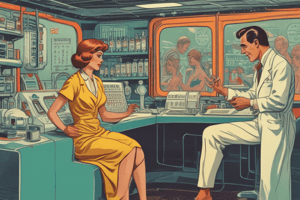Podcast
Questions and Answers
What are the uses of estrogen?
What are the uses of estrogen?
- Acne (correct)
- Male pattern baldness
- Cancer palliation (correct)
- Menopausal hormone therapy (correct)
What are some adverse effects associated with estrogen?
What are some adverse effects associated with estrogen?
- Endometrial cancer (correct)
- Gallbladder disease (correct)
- Drowsiness
- Breast cancer (correct)
Tamoxifen is primarily used for hormone replacement therapy.
Tamoxifen is primarily used for hormone replacement therapy.
False (B)
What is the primary use of progesterone in hormone therapy?
What is the primary use of progesterone in hormone therapy?
What should be considered for women who have undergone a hysterectomy?
What should be considered for women who have undergone a hysterectomy?
What is the purpose of emergency contraceptive pills?
What is the purpose of emergency contraceptive pills?
Flibanserin is not approved for ______ women.
Flibanserin is not approved for ______ women.
What are two uses of selective estrogen receptor modulators?
What are two uses of selective estrogen receptor modulators?
What is a risk associated with estrogen therapy?
What is a risk associated with estrogen therapy?
Match the following hormone therapies with their primary uses:
Match the following hormone therapies with their primary uses:
Study Notes
Estrogen
- Uses: menopausal hormone therapy, female hypogonadism, acne, cancer palliation, and gender affirmation
- Adverse effects: endometrial cancer, breast cancer, cardiovascular/thromboembolic events, gallbladder disease, and chloasma
- Contraindications: pulmonary embolism, stroke, deep vein thrombosis, myocardial infarction, pregnant women or those with vaginal bleeding without a known cause, history of liver disease, estrogen-dependent tumors, or breast cancer (except when indicated for management)
Estradiol
- Oral: used for menopausal hormone therapy
- IV: used for emergency control of heavy uterine bleeding
- Intravaginal: used in inserts, creams, and rings for vaginal atrophy associated with menopause
- Transdermal: used in emulsions, patches, gels, and sprays for hormone therapy; advantages include reduced total dose of estrogen, less nausea and vomiting, less fluctuation of blood levels, and lower risk for deep vein thrombosis and pulmonary embolism
Selective Estrogen Receptor Modulators (SERMs)
- Provide benefits of estrogen while avoiding its drawbacks
- Examples:
- Tamoxifen: inhibits cell growth in breast cancer, used to prevent and treat breast cancer; side effects include hot flashes, and receptor activation increases the risk of endometrial cancer and thromboembolism
- Raloxifene: similar to tamoxifen but does not cause receptor activation in the endometrium, reducing the risk of uterine cancer; approved for prevention and treatment of osteoporosis and breast cancer
- Bazedoxifene: used for prevention of vasomotor symptoms and osteoporosis in postmenopausal women with a uterus
Progesterone
- Uses: hormone therapy to counteract thickening of the endometrial lining caused by estrogen, dysfunctional uterine bleeding, amenorrhea, endometrial hyperplasia and carcinoma, and support early pregnancy in women undergoing IVF and preterm birth
- Adverse effects: breast tenderness, headache, abdominal discomfort, arthralgias, and depression
- Formulations: oral, IM, SubQ, intravaginal, intrauterine, and transdermal
Menopausal Hormone Therapy (HT)
- Consists of low doses of estrogen (with or without progestin) taken to compensate for the loss of estrogen during menopause
- Two regimens: estrogen alone and estrogen plus progestin
- Progestin is present to counterbalance estrogen-mediated stimulation of the endometrium and reduce the risk of hyperplasia and cancer
- Estrogen is the most effective treatment for genitourinary syndrome of menopause and vasomotor symptoms; use lowest effective dose and reassess need for continuation at regular intervals
Birth Control
- Oral Contraceptives (OCs) should be avoided by women with certain cardiovascular disorders and those over 35 years who smoke
- OCs can reduce the effects of warfarin and hypoglycemic agents
- Use a secondary form of contraception when starting an antibiotic
- Two main categories: estrogen plus progestin (combination) and progestin-only ("minipills")
- Estrogen-plus-progestin OCs reduce fertility by inhibiting ovulation, suppress release of FSH, and act in the hypothalamus and pituitary to suppress the midcycle luteinizing hormone surge
- Progestin-only OCs do not contain estrogen, do not cause thromboembolic disorders, and are less effective with more irregular bleeding
Emergency Contraception
- Progestin-only pills are most widely used (Plan B, Next Choice One Dose, and Next Choice) and contain levonorgestrel
- Take within 72 hours of unprotected sex
- Mifepristone is a synthetic steroid that blocks receptors for progesterone and glucocorticoids, approved for termination of early intrauterine pregnancy
Studying That Suits You
Use AI to generate personalized quizzes and flashcards to suit your learning preferences.
Related Documents
Description
This quiz covers the uses and adverse effects of estrogen therapy, including hormone replacement therapy, acne treatment, and cancer palliation, as well as its contraindications.



